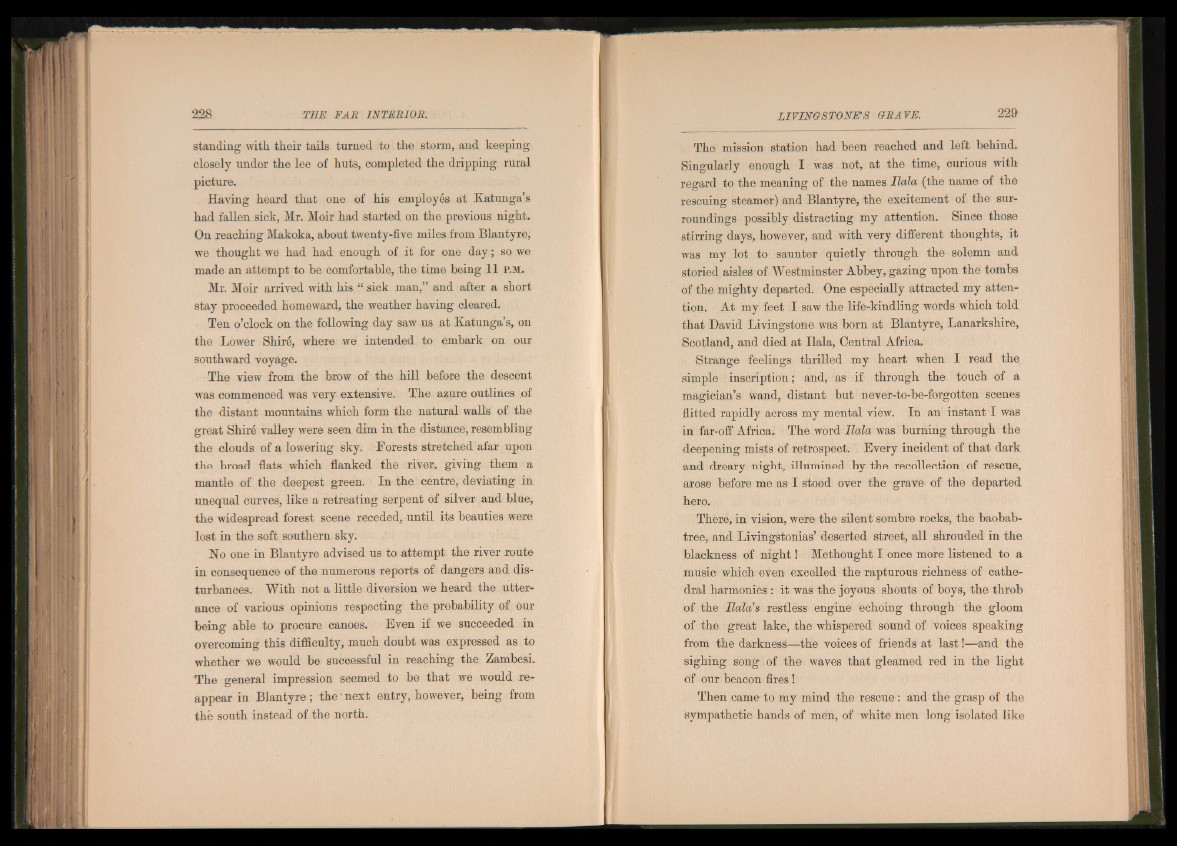
standing with their tails turned to the storm, and keeping
closely undor the lee of huts, completed the dripping rural
picture.
Having heard that one of his employes at Katunga’s
had fallen sick, Mr. Moir had started on the previous night.
On reaching Makoka, about twenty-five miles from Blantyre,
we thought we had had enough of it for one day ; so we
made an attempt to be comfortable, the time being 11 p .m .
Mr. Moir arrived with his “ sick man,” and after a short
stay proceeded homeward, the weather having cleared.
Ten o’clock on the following day saw us at Katunga’s, on
the Lower Shiré, where we intended to embark on our
southward voyage.
The view from the brow of the hill before the descent
was commenced was very extensive. The azure outlines of
the distant mountains which form the natural walls of the
great Shiré valley were seen dim in the distance, resembling
the clouds of a lowering sky. Forests stretched afar upon
the broad flats which flanked the river, giving them a
mantle of the deepest green. In the centre, deviating in
unequal curves, like a retreating serpent of silver and blue,
the widespread forest scene receded, until its beauties were
lost in the soft southern sky.
No one in Blantyre advised us to attempt the river route
in consequence of the numerous reports of dangers and disturbances.
With not a little diversion we heard the utterance
of various opinions respecting the probability of our
being able to procure canoes. Even if we succeeded in
overcoming this difficulty, much doubt was expressed as to
whether we would be successful in reaching the Zambesi.
The general impression seemed to be that we would reappear
in Blantyre ; th e - next entry, however, being from
thè south instead of the north.
The mission station had been reached and left behind.
Singularly enough I was not, at the time, curious with
regard to the meaning of the names Ilala (the name of the
rescuing steamer) and Blantyre, the excitement of the surroundings
possibly distracting my attention. Since those
stirring days, however, and with very different thoughts, it
was my lot to saunter quietly through the solemn and
storied aisles of Westminster Abbey, gazing upon the tombs
of the mighty departed. One especially attracted my attention.
At my feet I saw the life-kindling words which told
that David Livingstone was born at Blantyre, Lanarkshire,
Scotland, and died at Ilala, Central Africa.
Strange feelings thrilled my heart when I read the
simple inscription; and, as if through the touch of a
magician’s wand, distant but never-to-be-forgotten scenes
flitted rapidly across my mental view. In an instant I was
in far-off Africa. The word Ilala was burning through the
deepening mists of retrospect. Every incident of that dark
and dreary night, illumined by the recollection of rescue,
arose before me as I stood over the grave of the departed
hero.
There, in vision, were the silent sombre rocks, the baobab-
tree, and Livingstonias’ deserted street, all shrouded in the
blackness of n ig h t! Methought I once more listened to a
music which even excelled the rapturous richness of cathedral
harmonies : it was the joyous shouts of boys, the throb
of the Bala's restless engine echoing through the gloom
of the great lake, the whispered sound of voices speaking
from the darkness—the voices of friends at la st!—and the
sighing song of the waves that gleamed red in the light
of our beacon fires!
Then came to my mind the rescue: and the grasp of the
sympathetic hands of men, of white men long isolated like